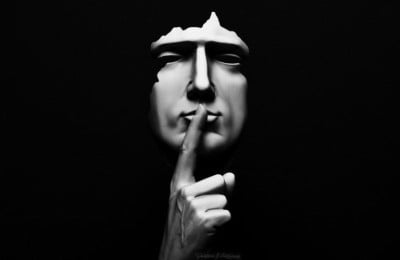All of us, at some point, have had an opinion about a controversial issue but refrained to express that opinion. This may be due to a host of reasons, be it fear of backlash or societal pressure, but is it right to refrain? Read on to find an answer.
Spiral of silence, is a term extensively used to describe many political and social situations. This term defines the circumstances under which a person refrains from expressing their views on a certain topic, due to the fear of social backlash and societal pressure. This backlash leads to either a forced change of views or silence altogether.If we look around, one will find several instances of this practice take place pretty regularly.
Be it the National Register of Citizens (NRC) – Citizenship Amendment Act (CAA) protests, or the Ayodhaya verdict, there was one thing common among all these, a large scale of dissent and assent. Both these factions were pretty rigid in their views and utterly disregarded the other side.
A student of Delhi University (DU), who does not wish to be named, says, “My dramsoc members were adamant to give the society’s official stand on CAA- NRC. When they asked me about my views on the same, I stated that I don’t want to express it, however, I condemn the violence during the protests. This led them to moral school me on the issue, even though they were pretty biased. How is this rational?” On the other hand, Pyare Shyam, a student of Hindu College, says, “Just a week before the elections, my parents wanted me to vote for BJP. But I just won’t. Hence, a series of taunts like “you don’t know anything about politics”, was shot at me.”
The moment we enter DU, one can see the restlessness of many students to find a political identity. In this dilemma, most of us, somehow, find such an identity and defend the same on all grounds, however fallacious we may be. In this process, we also, knowingly and unknowingly, shame others for having a different point of view.
Talking to students, I got to know about the effects of such a backlash. Students pointed out that this exclusion leads to major self-doubt and the adoption of silence as a defence mechanism. Some mentioned that whenever someone doesn’t agree with them, they just tell themselves that, “I know that I am right and that the person isn’t wise enough.” While others were adamant about the fact that, “People have forgotten to find a middle ground and understand that both the view points can be correct in a certain way. Everyone thinks that they are right about everything.”
According to some students, their friends have changed their views to get more social acceptance. “People who don’t even know everything about certain political and social issues, post various IG stories just to get social acceptance. It’s like people have forgotten to differentiate between hate and criticism”, says, Shinata Chauhan, a student of Maharaja Agrasen College.
Due to such extremes, neutrality gets lost and silence prevails. Trisha, a journalism student, says, “I don’t want to express my views anymore, as people won’t change themselves anyway and they are mature enough to understand issues themselves.”
Though the spiral of silence flourishes in the political sphere, it also blooms in common culture. Be it patriarchy, LGBTQ rights, sexism, casteism, etc., a wide generational gap makes the spiral go deeper and deeper.
Umaima, a student from Kamala Nehru College, comments, “I once told my mother that I don’t believe in God and the caste system. She was furious. And she had no facts to counter my arguments; in the end, she just told me that these are beliefs and you have to follow them.”
Martin Luther King Jr. once said, “Nothing in the world is more dangerous than sincere ignorance and conscientious stupidity.” It is important for one to realise as individuals, and as students, that despite many external stimuli and agents affecting our decision-making and thinking-both politically and ideologically, we must invest our time and efforts to make balanced and well-informed opinions. Be it the internet or others’ personal experiences, there is only so much that you can adopt from these sources. Beyond this, the judgement of either remaining silent or vocalising one’s views, rests in the individual’s own hands.
Feature Image Credits: DevianArt
Aniket Singh Chauhan





Comments are closed.